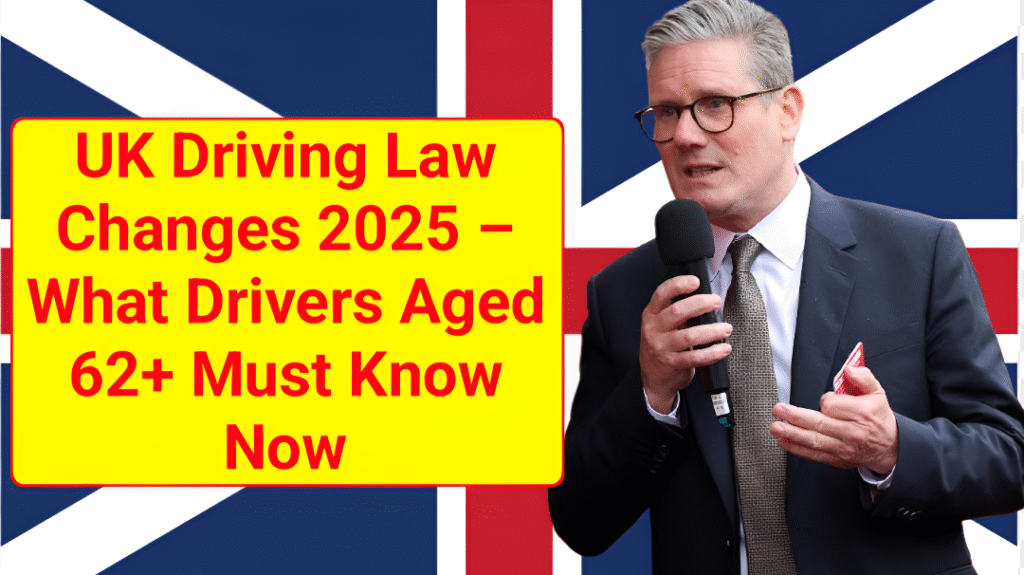Friends, Driving is part of everyday life for many of us, especially those aged 62 and over who value their independence. But with UK driving law changes coming in 2025, it’s more important than ever to understand what’s changing and how it may affect you. This article is written to feel like a friendly conversation—clear, helpful, and real. Whether you’re in England, Scotland, Wales or Northern Ireland, this guide breaks things down simply so you can stay legal, safe, and confident behind the wheel.
Licence Renewal & Automatic Checks
Starting in May 2025, the DVSA will begin sending automatic reminders when it’s time to renew your licence. This change is especially helpful for those aged 62 and above, making it easier to stay on track. You’ll get a heads-up about six months before your licence expires. But remember, it’s still up to you to fill in the form (online or paper) and pay the renewal fee. The system will also check if you have any health issues or penalty points, which could affect your renewal.
Medical & Health Reporting Updates
From 2025, the DVLA is tightening the rules on health disclosures. If you have conditions like diabetes, early-stage dementia, or have had a stroke, you’ll need to let them know—even if you feel fine. They’ll cross-check information with NHS Digital to make sure your health is compatible with safe driving. If needed, your GP or specialist might have to confirm you’re fit to drive. Ignoring this could lead to fines or even legal trouble.
New Eyesight Testing Standards
Vision is key when you’re behind the wheel. That’s why, from January 2025, new digital eyesight tests will be introduced for licence renewals. These tests are designed to check both how far you can see and how well you notice things at the sides. The rules are a bit stricter now, so even if you’ve passed before, you might need a check-up with your optician. Failing the eyesight test could result in a licence suspension until you’re cleared again.
Speed Awareness & Age-Related Courses
Speeding happens even to cautious drivers. But if you’re over 62 and caught speeding from April 2025 onwards, you might be offered a special awareness course designed for older drivers. These sessions aren’t meant to scare or punish you—they’re more like friendly refreshers, helping you adjust to modern roads and traffic conditions. In many cases, taking this course could reduce your penalty points and help you avoid court.
Changes in Insurance Premiums for Over-60s
Car insurance is another area seeing changes. While older drivers sometimes face slightly higher premiums, insurers are now being encouraged to look more closely at each driver’s actual risk. That means if you keep your health records up to date, pass your tests, and have a clean driving history, you could actually save money. Some insurers are also offering rewards for completing refresher courses or having no claims for several years.
Penalty Points & Digital Monitoring
One of the big updates in 2025 is a digital monitoring system introduced by the DVLA. It’s like a real-time dashboard tracking your licence status—points, renewals, and health checks. If you’re over 62 and you build up more than six points on your licence, it could trigger a full review. While it might sound a bit intrusive, the system is really about keeping roads safer and spotting issues early—especially before they become serious.
Important Documents to Carry
Don’t leave home without these:
- Photocard driving licence (or your paper one if it’s still valid)
- Car insurance certificate (paper or digital)
- MOT certificate (for vehicles over 3 years old)
- Any medical exemption paperwork
- An emergency contact card (great for peace of mind)
Having these ready can save a lot of hassle if you’re ever pulled over or in an emergency.
FAQs
1. Do I need to retake my driving test at 62?
Nope. But you will need to renew your licence and may be asked to pass a medical or eyesight check depending on your health.
2. What if I forget to report a health condition?
That could get serious. You could be fined up to £1,000 or even face legal action if you’re in an accident and the DVLA wasn’t aware of a health issue.
3. Will my car insurance go up automatically after 62?
Not necessarily. Insurers look at health, driving history, and even whether you’ve taken a refresher course. Clean records often mean better deals.
4. Can I do my licence renewal online?
Yes! The DVLA’s website is easy to use—just make sure you’ve got your passport number and any medical updates ready.
5. What are the new eyesight rules?
You’ll need to read a number plate from 20 metres and meet new side-vision standards. An optician can help confirm if you’re unsure.
6. Are these courses mandatory?
Only if you get a certain type of penalty. But voluntary ones are great for boosting confidence and updating your skills.
7. Do these new rules apply across the UK?
Yes, whether you live in England, Wales, Scotland or Northern Ireland, the 2025 laws apply everywhere.
Conclusion
Getting older doesn’t mean giving up your car keys—it just means being a bit more aware. With these 2025 changes, the focus is on support, safety, and helping you keep your freedom for as long as possible. Keep your health checks up, stay informed, and you’ll be good to go.
Disclaimer : This guide aims to provide practical and friendly information based on the latest driving law changes in the UK. It’s not legal advice. Always check directly with the DVLA or a qualified legal expert if you have specific questions or health-related concerns.
